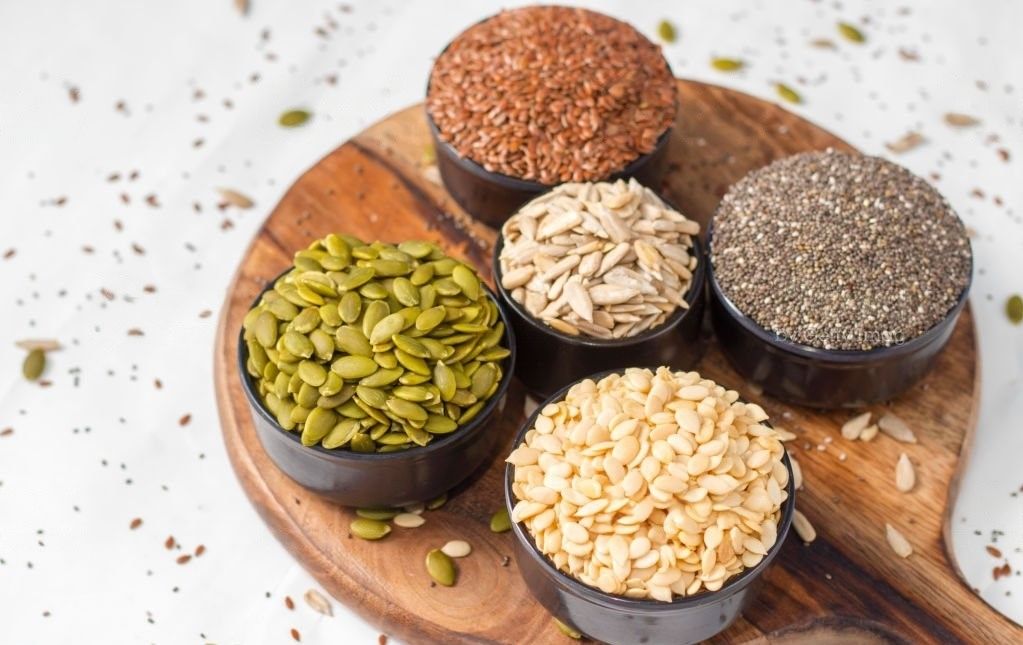Seed Cycling: A Natural Approach to Menstrual Health
Consuming specific seeds at various stages of the menstrual cycle promotes hormonal balance and improves menstrual health.

Menstrual health is an important aspect of women's overall health. Hormonal imbalances can cause a wide range of menstrual problems, including irregular cycles, painful cramps, and heavy bleeding. Seed cycling is a natural approach that has gained popularity in recent years. This method entails consuming specific seeds at various stages of the menstrual cycle in order to promote hormonal balance and improve menstrual health. We will introduce the concept of seed cycling and explain how it can help support hormonal balance and menstrual health in this blog.
Seed Cycling: The Basics
Seed cycling is a practice that involves consuming specific seeds during the two primary phases of the menstrual cycle - the follicular phase and the luteal phase. The aim of seed cycling is to provide the body with essential nutrients and fatty acids that can support hormonal balance and promote optimal menstrual health.
The Follicular Phase (Days 1-14)
During the follicular phase, which starts on the first day of menstruation and lasts until ovulation, it is recommended to consume:
- Flaxseeds: Rich in lignans and omega-3 fatty acids, flaxseeds can help modulate estrogen levels and promote hormonal balance during this phase.
- Pumpkin Seeds: High in zinc and essential fatty acids, pumpkin seeds support progesterone production and prepare the body for the luteal phase.
The Luteal Phase (Days 15-28)
During the luteal phase, which begins after ovulation and lasts until the start of the next menstrual cycle, it is suggested to consume:
- Sesame Seeds: Sesame seeds are rich in lignans and healthy fats, which can help to balance estrogen levels during the luteal phase.
- Sunflower Seeds: Packed with vitamin E and essential fatty acids, sunflower seeds support progesterone levels and overall hormonal balance.
How Does Seed Cycling Help Menstrual Health?
1.Hormonal Balance: Seed cycling provides the body with essential nutrients and fatty acids that can aid in the regulation of key hormones such as oestrogen and progesterone production and metabolism. Seed cycling can help improve menstrual health by maintaining hormonal balance.
2. Reduced PMS Symptoms: The nutrients in these seeds can help with PMS symptoms like bloating, mood swings, and fatigue. You may notice a reduction in these symptoms if you incorporate seed cycling into your diet.
3. Improved Menstrual Cycle Regularity: Hormonal imbalances can cause irregular menstrual cycles. Seed cycling may aid in menstrual cycle regulation by promoting hormonal balance throughout each phase.
4. Fertility: Hormonal imbalances can have a negative impact on fertility. Seed cycling may help by promoting hormonal balance.
How does seed cycling help support hormonal balance and menstrual health?
Seed cycling promotes hormonal balance and menstrual health by supplying the body with essential nutrients and fatty acids that regulate the production and metabolism of key hormones like estrogen and progesterone. Here's a breakdown of how seed cycling can help with menstrual health:
Hormonal Balance: The various seeds consumed during the menstrual cycle contain specific nutrients that can aid in hormone regulation. Flaxseeds and sesame seeds, for example, are high in lignans, which have a mild estrogenic effect and can help modulate estrogen levels. Pumpkin and sunflower seeds are high in essential fatty acids and micronutrients like zinc and vitamin E, which help with progesterone production and hormonal balance.
PMS Symptoms Reduced: Hormonal imbalances can cause a variety of premenstrual symptoms such as mood swings, bloating, and fatigue. The nutrients in seed cycling seeds can help alleviate these symptoms by promoting hormonal balance throughout the menstrual cycle.
Improved Menstrual Cycle Regularity: Hormonal imbalances can cause irregular menstrual cycles, with cycles that are either too short, too long, or unpredictable. Seed cycling may aid in menstrual cycle regulation by promoting hormonal balance throughout each phase.
Improved Fertility: Hormonal imbalances can have a negative impact on fertility by affecting ovulation and the overall menstrual cycle. Seed cycling may support optimal fertility in women who are trying to conceive by promoting hormonal balance.
SUMMARY
Seed Cycling is a natural menstrual health approach that has the potential to improve hormonal balance, reduce PMS symptoms, regulate menstrual cycles, and boost fertility. You can provide your body with essential nutrients and fatty acids that support overall hormonal health by incorporating specific seeds during the follicular and luteal phases of the menstrual cycle. While scientific research on seed cycling is still limited, many women have found this practise to be beneficial.
Jayti Shah is a Clinical Nutritionist with a master's degree in Clinical Nutrition and Dietetics. She is a member of the Indian Dietetic Association (IDA). Over the last 9 years, she has helped 400 clients in their clinical and weight loss journeys. She works with SocialBoat as a nutrition consultant.
At SocialBoat, we offer custom diet plans and guided workouts to help you achieve your goals in a 360-degree approach. Our gamified experience ensures that you don’t find workouts boring and we reward you for being consistent with your efforts.

REFERENCES
- Gaskins, A. J., & Chavarro, J. E. (2018). Diet and fertility: a review. American Journal of Obstetrics and Gynecology, 218(4), 379-389.
- Gromadzka-Ostrowska, J., & Szutowicz, M. (2021). The role of selected bioactive compounds in the prevention of Alzheimer's disease. Advances in Clinical and Experimental Medicine, 30(1), 99-108.
- Rietjens, I. M., Sotoca, A. M., Vervoort, J., & Louisse, J. (2013). Mechanisms underlying the dualistic mode of action of major soy isoflavones in relation to cell proliferation and cancer risks. Molecular Nutrition & Food Research, 57(1), 100-113.
- Adlercreutz, H., Höckerstedt, K., Bannwart, C., Bloigu, S., Hämäläinen, E., Fotsis, T., & Ollus, A. (1987). Effect of dietary components, including lignans and phytoestrogens, on enterohepatic circulation and liver metabolism of estrogens and on sex hormone binding globulin (SHBG). Journal of Steroid Biochemistry, 27(4-6), 1135-1144.
- Gossell-Williams, M., Davis, A., & O'Connor, N. (2006). Inhibition of testosterone-induced hyperplasia of the prostate of sprague-dawley rats by pumpkin seed oil. Journal of Medicinal Food, 9(2), 284-286.
